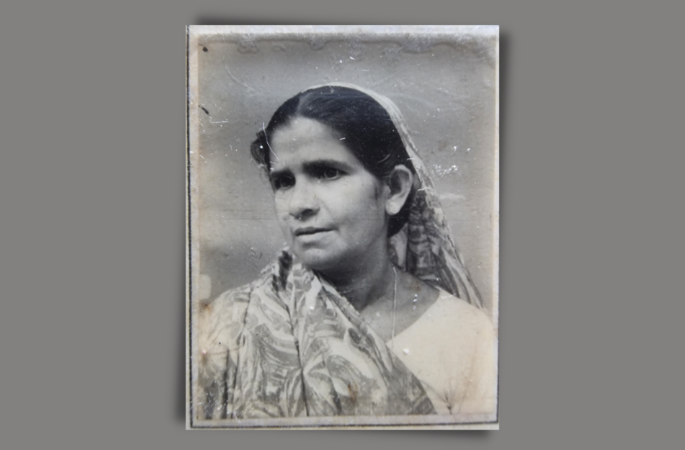The year was 2012. Exams were near. The day after was our exam. My sister and I locked ourselves up in a room and sat with cups of half-drunk tea and notes for the exam.
It was past midnight. Umma, tired of calling out to us several times to come and have our food, had gone to sleep. I must have gone to sleep on the floor with the Economics notebook spread on my chest. I don’t remember how long I had been asleep.
Some strange dream. Even before the dream was over, the phone rang. I ran and picked it up and heard someone crying: “Ummumma is not well. We are taking her to OSRO hospital. Please call Vappa.”
My legs moved of their own volition, and I found myself standing outside Vappa’s room. By then, an auto stood outside the house. I ran and tried to shake Vappumma, leaning back in the seat of the three-wheeler. “Vappumma, Vappumma,” I called out to her. Vappumma’s head fell back with a last long sigh.
Until the end, they said she had continued to ask for her eldest son. Her eldest son was Vappa. All medical efforts failed, and a soul winged its way to the Supreme One.
“Vappumma mauth aakittaanga…” (Vappumma is no more)
I don’t remember who uttered those words. But I fell down, unable to bear the weight of those words. I felt completely shattered. It was the first death that deeply affected me in my growing-up years.
Vappumma—
When Ummumma passed away, Umma was just three years old. Umma’s Vappa had been buried sometime before my birth.
When Appaa (Vappa’s Vappa), who was fair and tall, died, I was just six years old.
So far as we were concerned, the one who was a bridge to the magical world of the past was only Vappumma.
When I write about Vappumma, I cannot decide what I should write and what I should leave out. That is because my heart is filled with memories enough to write a book. Moreover, some memories are special; deeply personal. So I am steadfast about keeping those memories only between Vappumma and us.
Vappumma had studied only up to Fifth Standard. But even in those days, she was determined to educate her children. When she married Appaa, her family was wealthy. They owned even a car and had no money shortage. But unfortunately, they were later thrown into times of struggle for everyday meals. How much she must have endured to educate and take care of her nine children!
Vappumma’s clear instruction to all was that one should not exhibit one’s poverty and seek sympathy and help from others. She believed in the kind of hospitality where even if one was only wearing torn clothes, they must be washed clean. Even if they had porridge that did not quench hunger fully, if guests showed up, one had to cut the chicken in the home poultry, prepare a grand meal, and serve the guests.
Vappumma was a little shorter than an average woman. She had a wheatish complexion bordering on the darker shade. Her black hair did not turn grey till the end. She had crossed 83 summers at the time of her death.
Vappumma was not comfortable staying with her children. So till her last breath, she remained alone in the separate house in the land, built by Vappa.
When we go past that house with the number board with No:7 written on it hanging on the door we can see Vappumma standing at the entrance leaning on her walking stick…. Even today, I cannot tell if this is an illusion or real.
Vappumma’s house was modest heaven with a firewood stove on one side and some chairs on the other, with a dividing wall in between. She had many grandchildren of different ages.
Vappumma always kept some special snacks ready for the children. She considered even Vappa, who had crossed fifty and my chachas as children.
We have never returned from her house without dates, biscuits, rock sugar or the oil-dripping dodol or all of them pressed into our hands.
Have you heard the story of dates coming alive? I can’t help bursting into laughter even now when I think of it.
Vappumma could eat dates only after crushing them open in a small hand-held mortar and pestle. So one day, as usual, she put the date in the mortar and was about to crack it open. But the date slipped from the fingers and began to run fast, escaping the pestle. It turned out to be a cockroach!
And then there is Vappumma’s kiss. Again, not something one can easily forget.
I can still feel the warmth of that kiss on my cheeks. Since all of us had grown taller than Vappumma, we would bend down to receive that kiss which was an outpouring of all her love.
One of Vappumma’s grandsons had bought her a radio. She would listen to Muslim programmes on the radio.
Her life functioned according to an unwritten timetable. It was more disciplined than that of a working woman. She liked only half-ripe fruits. And she had to eat on time. Whether there was thunder or rain, she would bathe in the morning. She would not stop bathing even if she had a cold or fever. After the bath, she would drink tender king coconut water as a routine. After the bath, she would tie her hair into a tiny bun. The last time I saw her was with her hair pulled back into a bun. I did not know then that it would be the last time I would take leave of her.
Vappumma’s favourite colour was black-tinged red and dark violet. When Vappumma spoke, one felt as if one was watching a play. When she described some incidents, she would become the characters she was talking about. And in her language, there would be a generous mixture of words from colloquial Tamil no more in use.
I must tell you about Vappumma’s cooking. Those who walked past when she was cooking would need an extra nose. Especially the beef fry she made… my mouth waters even now when I think of it. I have eaten wide variety of beef fries cooked in western, eastern and Indian Chinese styles. But I can swear the taste and fragrance of Vappumma’s beef fry is something else; it is incomparable.
Vappumma had an old traditional almirah. It could be taken apart and put together. Our regular pastime was to open the almirah and run our hands over her saris smelling of naphthalene balls.
We have never seen her lying down sick on a mat. On the contrary, even the day before her death, she swept her garden and burned the trash.
Vappumma is a history by herself. I can offer her only prayers with raised hands and some tears.
You sleep in the qabr in the dark graveyard
Vappumma
No more the pain of listening to you again
Chatting as if narrating short stories.
At midnight when it rains and thunders
The dark graveyard and Vappumma’s dead body–
The memory of it is agony.
On Fridays Vappa never fails to say
That he saw you standing with your walking stick
Near the qabr.
I can fathom
The unbearable pain Vappa experiences
Even in his sixties.
Vappumma
The young henna tree that has flourished
soaking your body
May know
That death is only an exit door
And that life is endless.
* * *
Translated from Tamil by C S Lakshmi
First published under Family Tales in SPARROW Newsletter’s March 2022 issue.



